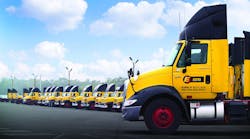LAS VEGAS. The current generation of heavy-duty trucks offer better fuel economy and increased safety, compared with earlier models, but a panel of fleet executives said they require more training for technicians and drivers than ever before.
“We have paid a price in terms of the complexity of the equipment and cost of the components,” said Mike Palmer, vice president of fleet services for Estes Express Lines.
Likewise, Gloria Pliler, director of purchasing for Daseke Inc., said aftertreatment systems have improved significantly in recent years. She noted earlier in the decade, while working for another large truckload carrier, aftertreatment issues cost about $900,000 annually.
Looking back at that time, she concluded “a lot of technology was released that wasn’t fully vetted or ready for production,” she said. “We did suffer a lot as a result.”
Palmer and Pliler spoke Jan. 28 at the Heavy Duty Aftermarket Dialogue event, taking place prior to start of Heavy Duty Aftermarket Week. Estes ranks No. 13 on the 2019 Fleet Owner For-Hire 500 list, while Daseke ranks No. 15.
Brett Wacker, vice president of maintenance with Dart Transit Co., agreed the current generation of trucks tend to be more reliable, though technicians do not always agree. However, he offered a theory for their beliefs.
They “think older trucks are more reliable because that is what our guys are familiar with,” said Wacker, whose company ranks No. 67. It takes time to get up to speed on the fault codes that newer trucks provide, creating a need for additional training, he said.
Often times means that “mom and pop” shops are not capable of properly servicing these vehicles without extended downtime, he added.
Pliler agreed, saying the “last place” Daseke’s operating companies look to take a truck is a small shop because they may not have updated training or be able to perform repairs under warranty on newer trucks.
As for when a truck has an incident on the road, Wacker said Dart aims to get the freight moving again in two hours. To accomplish that feat, the truck is towed to the nearest terminal, and the trailer is hooked to another available tractor.
Complex trucks are also changing how fleets train drivers to make sure they understand all of the technologies.
“If operators can’t operate [the truck], then it means nothing,” Wacker said.
Similarly, Palmer explained continual training is needed to ensure drivers can operate all of the trucks in Estes’ fleet, which include multiple manufacturers and different transmission options.
Also participating in the panel discussion was Lee Quinn, maintenance director of Point Ready Mix. With eight locations in Illinois and Wisconsin, the company is far smaller than these other fleets.
He said the company generally has found working with aftermarket vendors has provided better experience than dealers when it comes to replacement parts and maintenance.
Quinn also explained in the event a truck breaks down while hauling ready-mix concrete, limiting downtime is even more critical.
He said Point Ready Mix has agreements in place with local tow companies, so they already know if they receive a call, it means “we are under the gun.”



